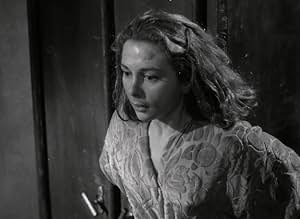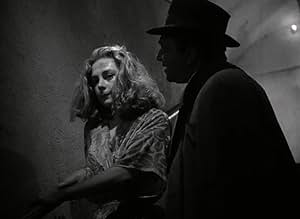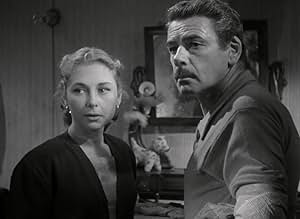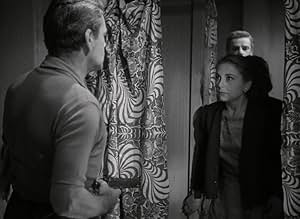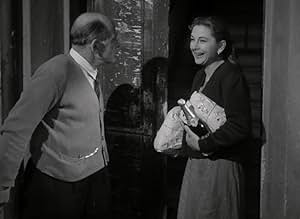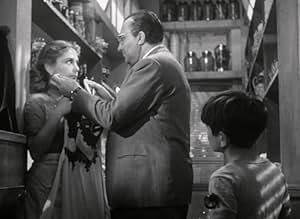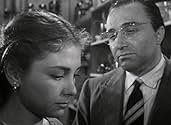Joan Lorring(1926-2014)
- Actress
- Soundtrack
Joan Lorring was born Madeline Ellis on April 17, 1926, in Hong Kong. She and her mother, Ania Fred, a Russian Jewish immigrant, left Hong Kong after the outbreak of WWII to pursue
an acting career, settling in California in the late 1930s. After
finding radio work in Los Angeles, Lorring worked her
way into films making a minor debut at age 18 in the romantic war drama
Song of Russia (1944) and
subsequently played the small part of Pepita in the ensemble suspense
The Bridge of San Luis Rey (1944).
The following year Joan won the coveted role of the scheming, trampy Bessie opposite Bette Davis in The Corn Is Green (1945), earning a Academy Award nomination for "best supporting actress" in the process. She may have lost the Oscar trophy that year to Anne Revere for National Velvet (1944) but Warner Brothers Studio was more than impressed with the up-and-comer and eagerly signed her up. Joan proved quite able in a number of juicy film noir parts, including Three Strangers (1946) and The Verdict (1946), both opposite the malevolent pairing of Sydney Greenstreet and Peter Lorre.
Inexplicably her film career went into a rapid decline by the end of the decade. As a result she sought work elsewhere and maintained with stage, radio and small screen endeavors into the next decade. On Broadway she made her debut in the prime role of budding college student Marie who sets off the explosive dramatic action in "Come Back, Little Sheba" (1950) starring Shirley Booth and Sidney Blackmer. She continued with strong roles in "The Autumn Garden" (1951), "Dead Pigeon" (1953) and "A Clearing in the Woods" (1957).
Among Joan's many 1950s dramatic showcases on TV was her portrayal of suspected ax-murderess Lizzie Borden's sister Emma on an Alfred Hitchcock episode. In the 1970s, Joan made a mini comeback in the Burt Lancaster movie The Midnight Man (1974) as Cameron Mitchell's wife. She also performed on radio soap operas and appeared for a season on the TV soap Ryan's Hope (1975) before phasing out her career once again.
Long married to New York endocrinologist Dr. Martin Sonenberg, who died in 2011, Joan passed away on May 30, 2014, in Sleepy Hollow, New York, survived by two daughters.
The following year Joan won the coveted role of the scheming, trampy Bessie opposite Bette Davis in The Corn Is Green (1945), earning a Academy Award nomination for "best supporting actress" in the process. She may have lost the Oscar trophy that year to Anne Revere for National Velvet (1944) but Warner Brothers Studio was more than impressed with the up-and-comer and eagerly signed her up. Joan proved quite able in a number of juicy film noir parts, including Three Strangers (1946) and The Verdict (1946), both opposite the malevolent pairing of Sydney Greenstreet and Peter Lorre.
Inexplicably her film career went into a rapid decline by the end of the decade. As a result she sought work elsewhere and maintained with stage, radio and small screen endeavors into the next decade. On Broadway she made her debut in the prime role of budding college student Marie who sets off the explosive dramatic action in "Come Back, Little Sheba" (1950) starring Shirley Booth and Sidney Blackmer. She continued with strong roles in "The Autumn Garden" (1951), "Dead Pigeon" (1953) and "A Clearing in the Woods" (1957).
Among Joan's many 1950s dramatic showcases on TV was her portrayal of suspected ax-murderess Lizzie Borden's sister Emma on an Alfred Hitchcock episode. In the 1970s, Joan made a mini comeback in the Burt Lancaster movie The Midnight Man (1974) as Cameron Mitchell's wife. She also performed on radio soap operas and appeared for a season on the TV soap Ryan's Hope (1975) before phasing out her career once again.
Long married to New York endocrinologist Dr. Martin Sonenberg, who died in 2011, Joan passed away on May 30, 2014, in Sleepy Hollow, New York, survived by two daughters.


